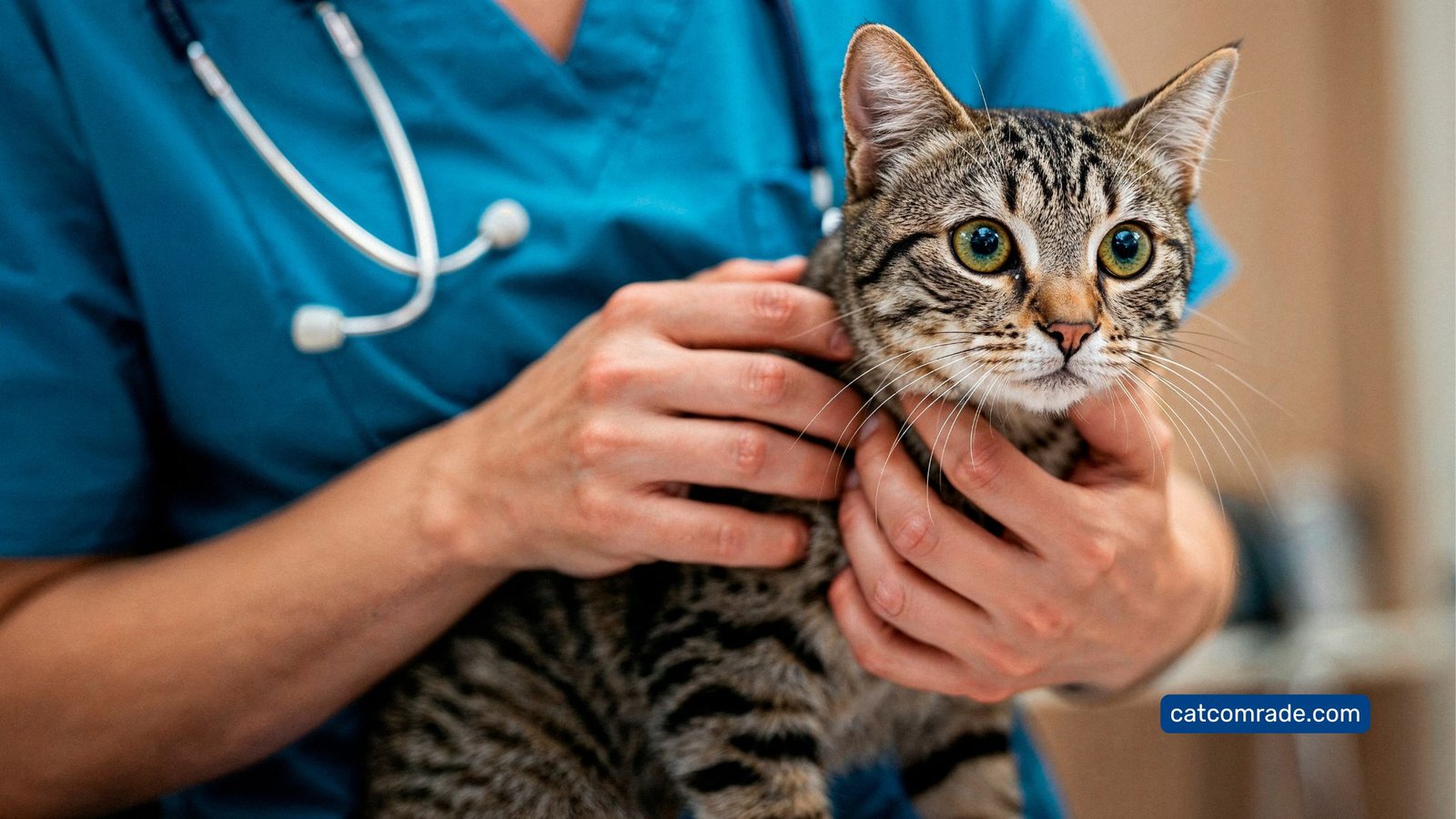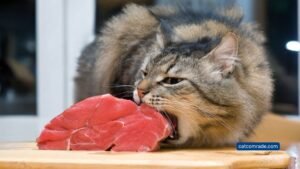Why Not Feed Cat before Surgery: Essential Safety Steps

You love your cat and want to ensure they receive the best care, especially when surgery is involved.
But did you know that feeding your cat before surgery can have serious consequences?
If you’re feeling unsure and anxious about your pet’s upcoming procedure, you’re not alone. Many cat owners are surprised to learn that something as simple as feeding can impact surgery outcomes.
By understanding why your vet recommends fasting your feline friend, you can help ensure their safety and well-being.
Keep reading to discover the crucial reasons behind this pre-surgery guideline, and gain peace of mind knowing you’re taking the right steps for your beloved pet.

Credit: www.optivet.com
Pre-surgery Fasting For Cats
The idea of not feeding your cat before surgery might seem strange, especially when they meow with those pleading eyes. However, pre-surgery fasting is crucial for their safety.
It’s about preventing complications during anesthesia, ensuring your beloved feline wakes up without unnecessary issues.
Understanding The Importance Of Fasting
Fasting reduces the risk of vomiting during surgery. If a cat vomits under anesthesia, it can lead to aspiration pneumonia a serious condition where vomit enters the lungs.
This can complicate recovery and prolong hospital stays. Think about this: Would you want your pet to face difficulties just because they had a snack before surgery?
It’s a simple step that can make a huge difference.
How Long Should Cats Fast Before Surgery?
Typically, vets recommend withholding food for 8 to 12 hours before surgery. Water is usually allowed up to a few hours prior. This timeframe minimizes the risk of anesthesia-related complications.
Imagine yourself in a similar situation—going without food for a few hours. It’s challenging, but knowing it prevents potential risks makes it worthwhile.
Exceptions To Fasting Rules
Not all cats require strict fasting. Kittens and diabetic cats have different needs. Discuss these specific cases with your vet to tailor the fasting plan accordingly.
Have you ever considered that your kitten might need a different approach than your adult cat? It’s crucial to have that conversation with your vet.
Preparing Your Cat For Fasting
Ease your cat into fasting by adjusting meal times the day before surgery. Gradually reducing food intake can help them adapt without stress.
Would you prefer a smooth transition over a sudden change that leaves your cat confused and hungry? Think about their comfort and well-being.
Monitoring After-Surgery Recovery
Post-surgery, your cat might be groggy and less interested in food. Offer small, easily digestible meals to help them recover gradually.
Have you ever watched your pet slowly regain their energy after surgery? It’s a rewarding process that requires patience and care.
Pre-surgery fasting is not just about following rules. It’s about caring for your cat and ensuring their surgery and recovery are as smooth as possible. Isn’t it worth it to take that extra step for your furry friend?
Risks Of Feeding Before Surgery
Before your cat undergoes surgery, it’s crucial to follow the veterinarian’s instructions about feeding. Ignoring this advice can lead to significant risks during the procedure.
Understanding these risks will help you make informed decisions for your pet’s safety.
Anesthesia Complications
Feeding your cat before surgery can cause serious anesthesia complications. Anesthesia relaxes the muscles, including those that control swallowing.
If your cat has food in its stomach, there’s a risk that the food could move into the esophagus and reach the lungs. This can lead to aspiration pneumonia, a severe and potentially life-threatening condition.
Have you ever wondered why veterinarians emphasize fasting? It’s because they aim to minimize such risks, ensuring your cat wakes up safely after surgery.
Following pre-surgery fasting guidelines is a small step that plays a huge role in preventing anesthesia-related issues.
Increased Vomiting Risk
Another concern when feeding your cat too close to surgery is the increased risk of vomiting. Anesthesia can make your cat feel nauseous. If the stomach is full, the likelihood of vomiting rises.
Imagine your cat waking up from surgery only to face the discomfort of vomiting. It’s not only distressing but can also interfere with the healing process.
By withholding food, you significantly reduce this risk and help your cat recover smoothly.
So next time, even if those pleading eyes make you second-guess, remember the greater good. How often have you felt guilty about skipping a meal for your pet, only to realize it was for their well-being?
These small acts of care reflect your commitment to their health and safety.
Understanding Anesthesia In Cats
Anesthesia is crucial for cat surgeries. It ensures the cat feels no pain. Knowing how it works helps pet owners prepare. The process is complex, but essential for safety. Let’s explore its impact on the cat’s body.
How Anesthesia Works
Anesthesia numbs the senses. It induces sleep and prevents pain. Vets use it to perform surgeries safely. The cat’s brain receives signals to relax. This stops pain and movement. It ensures the cat stays still during surgery.
Effects On Digestive System
Anesthesia affects the cat’s digestion. It slows down the digestive process. Food in the stomach can cause complications. Vomiting is a risk during anesthesia.
This is why fasting is important. An empty stomach reduces risks significantly.
Preparing Your Cat For Surgery
Getting your cat ready for surgery can seem daunting. Proper preparation ensures your pet’s safety and comfort. Knowing the right steps helps ease the process. Follow these guidelines for a smooth experience.
Fasting Schedule
Cats need an empty stomach before surgery. Food can cause complications during anesthesia. Start fasting 12 hours before surgery. Remove all food sources. Ensure your cat does not sneak snacks.
Hydration Guidelines
Water is essential for your cat’s health. Do not restrict water unless advised by a vet. Hydration supports recovery and well-being. Monitor your cat’s water intake. Encourage drinking to prevent dehydration.
Post-surgery Care Tips
Post-surgery care for your cat is crucial for a smooth recovery. Proper care can speed up healing and reduce complications.
Understanding the steps to take will help your furry friend feel better faster. Let’s dive into some essential tips.
Reintroducing Food
Start by offering small amounts of water first. This helps gauge your cat’s ability to swallow. If your cat handles water well, introduce food in small portions.
Choose soft, bland foods for the first few days. Monitor your cat’s appetite and adjust as needed. Don’t force your cat to eat if it seems uninterested. Patience is key during this phase.
Monitoring For Complications
Keep a close eye on your cat for any signs of distress. Look for changes in behavior or energy levels. Check for swelling, redness, or discharge around the surgical site.
Vomiting or diarrhea might indicate complications. Contact your veterinarian if anything seems off. Timely intervention can prevent serious issues.
Credit: ocgainesville.org
Common Myths Debunked
Feeding cats before surgery is a topic filled with misconceptions. Many pet owners worry about their cat’s hunger and distress. But understanding the truth behind these myths is crucial.
It ensures the safety and health of your beloved feline.
Misconceptions About Fasting
One common belief is that cats can’t handle fasting. People think skipping meals harms their health. But this isn’t true for pre-surgery fasting. Cats need an empty stomach before anesthesia for safety.
Food in the stomach can cause complications during surgery. It might lead to vomiting or choking.
Another myth is that fasting stresses cats significantly. While hunger discomfort is normal, cats manage fasting well.
Veterinarians recommend it for a short period. This practice prevents risks during surgical procedures.
Clarifying Safety Concerns
Some owners fear fasting harms their cat’s health. They worry about dehydration and weakness. But cats are resilient and cope with temporary fasting.
Water is usually allowed until a few hours before surgery. This keeps them hydrated.
Pre-surgery fasting is a standard veterinary protocol. It ensures anesthesia is administered safely.
Fasting helps avoid any unexpected reactions during the procedure. Veterinarians prioritize safety by enforcing these guidelines.
Understanding the necessity of fasting dispels these myths. It reassures pet owners about their feline’s well-being. Trust in veterinary advice is key to a safe surgical process.
Frequently Asked Questions
What Happens If My Cat Eats Before Surgery?
Eating before surgery can cause complications, like vomiting or aspiration during anesthesia. Follow your vet’s fasting instructions.
How Many Hours Before Surgery Should My Cat Stop Eating?
Cats should stop eating 8-12 hours before surgery. This fasting period helps prevent complications during anesthesia.
Always follow your veterinarian’s specific instructions for your cat’s procedure. Providing water is usually allowed, but confirm with your vet.
What Happens If My Cat Drank Water Before Surgery?
Drinking water before surgery may increase the risk of aspiration in cats. Inform your vet immediately for guidance.
They might need to reschedule the procedure or take extra precautions to ensure your cat’s safety during anesthesia. Always follow pre-surgery instructions carefully to prevent complications.
Why Shouldn’t Cats Eat Before Surgery?
Cats should fast before surgery to reduce the risk of aspiration. Food in the stomach can cause complications during anesthesia. It can lead to vomiting and choking.
Fasting ensures a safer surgical procedure. Always follow your vet’s specific fasting instructions for your cat.
Conclusion
Feeding your cat before surgery can cause complications. Food in the stomach might lead to vomiting. This could block their airway. It’s crucial to follow vet instructions.
They know the best for your pet. Timing is key. A hungry cat might be tough, but safety matters more.
Surgery on an empty stomach reduces risks. Your cat’s health depends on your care. Trust the experts and keep your furry friend safe.
Always prioritize their well-being over comfort. Cats will be back to normal soon. Your patience and understanding make a big difference.






